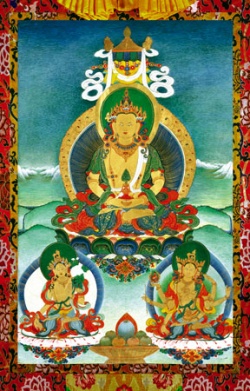Difference between revisions of "Sarvāstivāda Abhidharma"
| Line 32: | Line 32: | ||
[http://informatica.pvanhorne.nl/~stijn.c/data/pages/wikiPage.php?page=Abhidharma§ion=5&lang=en informatica.pvanhorne.nl] | [http://informatica.pvanhorne.nl/~stijn.c/data/pages/wikiPage.php?page=Abhidharma§ion=5&lang=en informatica.pvanhorne.nl] | ||
[[Category:Sarvāstivāda]] | [[Category:Sarvāstivāda]] | ||
| + | [[Category:Abhidharma]] | ||
Latest revision as of 22:21, 21 February 2015
Like the Theravada Abhidharma, the Sarvāstivāda Abhidharma also consists of seven texts. However, comparison of the content of the Sarvāstivāda texts with that of the Theravāda Abhidhamma reveals that it is unlikely that this indicates that one textual tradition originated from the other. In particular, the Theravāda Abhidharma contains two texts (the Katha Vatthu and Puggala Pannatti) that some consider entirely out of place in an Abhidharma collection.
Core texts
The texts of the Sarvāstivādin Abhidharma are:
Sangitiparyaya ('Discourses on Gathering Together')
Dharmaskandha ('Aggregation of Dharmas')
Prajnaptisastra ('Treatise on Designations')
Dhatukaya ('Body of Elements')
Vijnanakaya ('Body of Consciousness')
Prakaranapada ('Exposition')
Jnanaprasthana ('Foundation of Knowledge')
Vaibhāṣika texts
Following these, are the texts that became the authority of the Vaibhāṣika, the Kasmiri Sarvāstivāda Orthodoxy:
Mahavibhasa ("Great Commentary", on the Jnanaprasthana)
Little research in English has been made in these texts, although all of them are summarized, many in fine detail, in the Encyclopedia of Indian Philosophies, Vol. VII: Abhidharma Buddhism.
Other Sarvāstivādin texts
In addition to the canonical Sarvāstivādan Abhidharma, a variety of commentaries were written to serve as introductions to the Abhidharma. The best known commentaries belonging to the Sarvāstivādan tradition are:
Abhidharmakosha (Treasury of Higher Knowledge) by Vasubandhu - a highly influential commentary in Chinese and Tibetan Buddhism
Abhidharma-hṛdaya (The Heart of Abhidharma) by Dharmaśrī
Abhidharmaāmrtaṛasa (The Taste of the Deathless) by Ghoṣaka.
